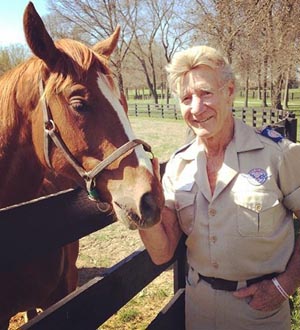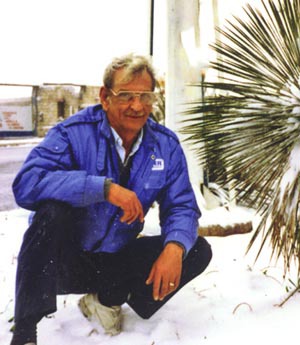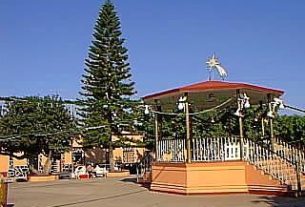Westwords

This story starts on the evening of September 9, 1991 at the National Guard Armory in Knoxville, Tennessee.
Stan Brock, an unusual Englishman made semi-famous by his role in the TV series Wild Kingdom, had founded something called Remote Area Medical and was soliciting volunteers for a three-week mission to one of the Tuxpans somewhere in the mountains of Mexico.
Brock — a cowboy at heart, dressed in his trademark Jungle Jim outfit — was a compelling communicator. People sat up and paid attention. His British accept added authority.
He described the poverty, misery and misfortune that plagued the small village. He talked of deadly disease and infant mortality. His plea for the primitive Indians, the Huichols, may have actually triggered a few tears among the tough military trainees.
Stan wasn’t real clear on how he was going to pull off this project or even where Tuxpan was but he drew a rough sketch of Mexico and placed a large X where it might be. Accidentally or on purpose, he created some intrigue.
One of my old friends, Alexander Dumas, 64 at the time, was hooked.
He and his wife, Jeannette, were excellent artists and owned a gallery but he decided both had credentials that matched the mission and should do what they could. Jeannette’s college degree was in biology. Alexander had studied pre-med at the University of Virginia, had been a hospital corpsman and clinical lab technician in the Navy, had worked as a nurse in neurosurgery and logged 14 years in pharmaceutical sales.
Alex was ready to roll. Jeannette saw the need for more information. She didn’t say no but she suggested they do a little research on Stan Brock and Remote Area Medical.
Instead of wondering about the mission, Dumas worried that he might be too old to be chosen. When Brock called seeking help in arranging the next RAM meeting, Alex saw that he might find a place.
“When Stan Brock spoke, he resembled Napoleon addressing his troops before battle,” recalled Dumas.
“There was absolutely no doubt as to who was in charge. He mesmerized the entire audience.”
This time, Brock had slides of awesome scenery, rugged landscapes and a picture of a Huichol mother holding her deathly ill child.
Stan Brock tugged at heartstrings. He also handed out brochures that listed needed volunteers for the mission doctors, dentists, specialists in plastic surgery, pediatrics, dermatology, somebody to repair cleft palates.
The brochures featured Brock’s picture and bio.
The plan sounded good. The primary professionals would fly into Zacatecas (at their expense). Nurses and support people would travel from Knoxville aboard a brand new luxury bus (equipped with TV and VCR to show Wild Kingdom). Details included driving time and overnight stops with free housing and food.
Stan Brock, being a licensed pilot, would fly a donated DC-3 with necessary medical equipment and supplies if he raised enough funds to make the old plane airworthy.
Brock had answers. He knew there was more than one Tuxpan. He explained why his target was missing from real maps. Population was 350, mostly Indians. Not to worry, many others would walk in for free treatment. The mission might serve 5000.
Brock mentioned money. He said $25,000 might be enough. He suggested that those interested in RAM make a small donation and ask friends and neighbors to contribute.
Alex and Jeannette Dumas studied the brochure at home. It said Stan Brock was a skilled writer, a published author, a pioneer bush pilot in the Amazon with experience in exploration, discovery and foreign trade.
He was an authority on wildlife conservation and rain forests, a research associate of the Royal Ontario Museum, a certified flight instructor and a physical fitness expert with a black belt in karate. He was a film maker and lecturer and fluent in English, Portuguese, Spanish and Wapishana.
Stan claimed to have no funds, no possessions, not even a bed. He slept on a mat on the floor of a dilapidated school building he rented for $1 a year. He didn’t even have a chair at his house. He said sitting down was bad for health.
When donations included gas, he drove a beat-up car. He said he had one bowl, a gift, for his daily nourishment, mostly oatmeal or rice or beans and an occasional piece of fruit, regular contributions from friends and admirers. The implication was all he had earned had gone to help others. Indeed, he was a pure philanthropist at heart and still lives — at 78 — to aid the poor and afflicted.
Only later did it occur to Dumas that there was no mention of experience in organizing medical missions. Confusion eventually appeared. Not far behind was chaos.
Plans and faces changed. One revision said there was no luxury bus and that volunteers should make their own transportation plans and meet in Zacatecas. Volunteer nurses low on funds squelched that idea.
The DC-3 wouldn’t fly so medicines and equipment would be hauled in a borrowed pickup truck. Brock was pleased to announce that he had acquired the use of a converted school bus for people transportation.

There was one complication. The bus had been to Mexico previously, on religious outings, and had “Jesu Cristo es El Senor” painted on the side. Brock didn’t really want to mix Jesus Christ is Lord with free medical care but couldn’t afford to turn down generosity.
Speaking of free, Dumas letters and calls on behalf of Brock to drug companies were supposed to generate many donations. Dumas became chief supply officer in charge of making a list for Mexico customs inspectors.
“I had assumed Stan had medicine stored somewhere. I was absolutely dumbfounded. Thirty days before departure, we had two bags, one of vitamins, one of pain relievers.”
Things changed. Many drug samples came in from doctors. Ross Laboratories sent cases of Similac. Large shipments of antibiotics arrived. The Dumas gallery became one storehouse. Art students were careful not to topple stacked boxes. There were 5000 Benadryl tablets, 16,000 cotton swabs, 6000 toothbrushes, 250 pairs of eye glasses, a giant supply of IV solution.
Stan borrowed dentist chairs and operating tables from Tennessee Civil Defense. The stuff had been stored for years or decades in case of nuclear attack. He also acquired an enclosed trailer to haul the load behind the pickup truck or school bus.
Brock delegated all duties. He wasn’t interested in the experiences of others who had been to Mexico on charitable adventures. He sought no guidance.
“My people in Mexico know what they are doing.”
Remember that line.
Dumas remembers inoculations against tetanus and diphtheria and talk of altitude sickness. Everybody was advised to get high-top boots. The terrain would be rugged. There might be snakes.
Planned departure got snarled. A very emotional Stan Brock called his supply sergeant to say a few details had been overlooked. This Tuxpan was not in the state of Zacetecas. It was in Jalisco. The governor was upset because no one had sought permission for the mission. He had called the state minister of health who called the federal minister of health who issued an order forbidding Remote Area Medical from entering Mexico.
Stan took the disruption very personally.
“I’m not jumping through any damned hoops.”
What resulted were delays and cancellations and revisions and a real change in plans. To hell with Tuxpan, the mission just won’t go there.
One of Stan’s friends knew Susana Valadez who just happened to operate the Huichol Center for Cultural Survival in the town of Santiago Ixcuintla in the state of Nayarit. Stan said she knew that governor and would arrange an arms-open-wide welcome.
Delays led to other delays. Some medical missionaries ran out of vacation time and gave up. New volunteers were enlisted. Potatoes and onions, packed to feed travelers, sprouted and were discarded.
More meetings followed other meetings. The third or fourth new departure date was established. The bus failed a final exam. The voltage regulator malfunctioned. The parts store was closed. Maybe mañana.
Dumas had more than 1100 line items ready for Mexico customs but the mission was no closer to the border than it had been three months earlier.
Finally, on a cold, dark night in mid-January, the expedition of 15 people, one converted bus, one pickup truck and one large trailer moved carefully away from Knoxville in the general direction of Brownsville, Texas. After 30 miles, Stan called time out. The bus engine was coughing and sputtering. After much tinkering but no repairs, the party moved again. Every few miles, the bus would misbehave. Every so often, the group would go again. Maybe there was water in the fuel tank but Brock didn’t want to hear it. He was not, not, not going to drain and throw away $100 worth of gasoline.
RAM-1 made it to Baton Rouge in just 17 ½ hours. A host couple, friends of Stan, provided Louisiana red beans and rice. In Houston, the travelers found highway construction as usual. The planned stop in Harlingen, at the home of another Brock friend, didn’t go as planned. It was 4 a.m. and three men were having some strange kind of meeting.
The delegation paused at Brownsville. For some reason, General Brock was in no hurry to cross the border. He finally decided it was too late in the day. A man they met at a gas station invited them to spend the night at a church camp.
Another friend of Stan’s was supposed to meet the group and assist with border requirements. He didn’t show. Two young Mexican religious missionaries were picked up as guides.
In the middle of the next day, the group drove across the Rio Grande toward Matamoros. It didn’t get very far.
Everybody lined up for tourist visas and then stood around. Stan spent a lot of time trying to talk with Customs officials. Something was wrong. It turned out Brock did not speak Spanish.
“I remembered that brochure which said Stan was fluent in four languages,” said Dumas.
The Mexicans had a question about “the letter.”
There was no letter, no official invitation for the medical mission to offer free health care to the poor. Somebody had forgotten or fumbled. RAM-I spent 50 hours in the customs holding pen.
“If the devil himself had written the script, it could not have been more bizarre,” said Dumas.
Clearance was finally granted. At the 27-kilometer checkpoint, the agent didn’t want the carefully prepared list of what was on board, didn’t want to look inside the trailer, didn’t really want to be bothered.
After that, the bus and the pickup and the trailer drove on, got separated once or twice, got lost once, forged on through blizzard weather near Saltillo, came face to face with terror in blackness and rain (a herd of cattle in the road) and a few other nightmares.
Angry words were exchanged over whether it was okay to smoke and have a can of beer in the Jesus bus. Mountains outside Zacatecas were a dangerous challenge. A miles-long religious procession along the highway outside Guadalajara was stunning. There was a traffic jam in Tequila. It was night in Tepic.
The Santiago River was almost up to bridge level as RAM-1 approached Ixcuintla. Roads were washed out. The delegation took detours. Arrival was anticlimactic. A trip that was charted at four days took 10.
The Huichol Center was a letdown. Susana said all sleeping rooms were full.
Four doctors, two dentists, two nurses and a veterinarian preceded the road-runners and had done what they could while waiting a week for medicine, equipment and supplies.
A young Mexican-American doctor joined the workforce as part of his obligation for his medical degree in Tepic. He finally gained enough confidence to ask if he could ask a question.
“What is a stan brock?”
He had heard the term several times but had no idea it was the mission leader.
Alex Dumas recalls that the doctors saw many patients, not so many Huichols, mostly regional people who had heard about free assistance. Jeannette Dumas gave away hundreds of toothbrushes but had many leftovers. Young folk in the village were curious but very kind. The governor was busy but his wife stopped by for lunch.
“I absolutely loved the country and its people,” said Dumas.
Compared to the southbound journey, the return to Tennessee was uneventful.
Dumas tells the Mexico mission story much better in his book, “Angel with a British Accent.”
Obviously the man who conceived the idea of RAM, gave his all and is still giving is the angel, Stan Brock.
If you send Dumas an e-mail ([email protected]), he’ll mail you, for a small fee, an autographed copy. Interesting book, very interesting.


Mexico Medical Missions is a non-denominational Christian organization that provides medical and community development services to the people. To bring compassionate care and the message of the Gospel .